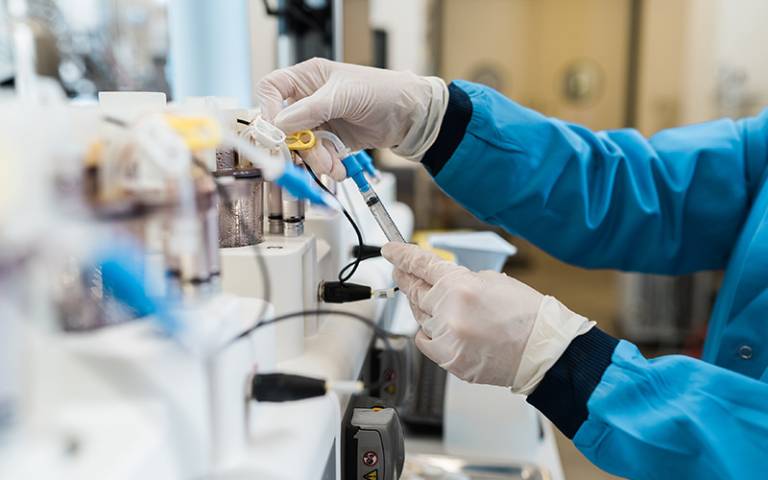New research hubs will improve vaccine access in low- and middle-income countries
6 November 2023
A new vaccine hub that will address the challenges of vaccine manufacturing and delivery in developing countries will be led by experts at UCL and the University of Oxford.

The Vaccines Manufacturing Hub for LMIC (Vax-Hub Global) is one of four new hubs that will be led by UCL, the University of Oxford, Imperial College London and the University of Sheffield, working with experts from across Africa, Asia, and Latin America. The hubs will use the lessons from the global rollout of Covid vaccines to improve the processes of manufacture and distribution in low and middle-income countries (LMICs).
Communicable disease epidemics are still a major threat to public health globally. They are responsible for half of all deaths in low- and middle-income countries and it is estimated that 25 million children are under or unvaccinated, despite vaccines being available for more than 20 life threatening diseases.
Vax-Hub Global was awarded £10 million in funding over four and a half years. It will be led by Professor Martina Micheletti (UCL Biochemical Engineering) and Dr Catherine Green from the University of Oxford.
The vision of the Hub is to deliver flexible, easily transferable multi-product platforms and simplified engineering solutions that enable development of low cost, effective and globally deployable vaccines to LMICs. The hub will work on existing and new vaccine platform technologies, such as adenoviral-based, virus-like particles, mRNA and bioconjugates, which can be used in vaccine development for diseases such as polio, dengue fever and pneumococcal disease.
Professor Micheletti said: "The number of children who do not receive any vaccines is astonishing and there is still a significant divergence between the number of vaccines needed by low- and middle-income countries versus the number of doses they produce. Vax-Hub Global aims to reduce this gap by making vaccines that can be manufactured quickly, more cheaply, and can be administered easily. We have had amazing endorsement from our collaborators in Brazil, Africa and South-East Asia for this grant and we can't wait to start the project."
Will Quince, UK Minister for Health and Secondary Care, launched the hubs at a meeting on science, technology and health cooperation between the UK and the Association of Southeast Asian Nations (ASEAN) with the Secretary General of ASEAN, Dr Kao Kim Hourn, and the UK Minister for Science, Research and Innovation, George Freeman.
The vaccine hubs have received a share of £33 million of UK aid funding via the Department of Health and Social Care (DHSC), and a further £1.5 million from the Engineering and Physical Sciences Research Council (EPSRC). The hubs will be part of the UK Vaccine Network Project to develop vaccines for diseases with epidemic potential in LMICs. The EPSRC co-funding will leverage impact from the hubs’ research for the UK, delivering against EPSRC priorities to transform health and healthcare.
Professor Miles Padgett, Interim Executive Chair of the Engineering and Physical Sciences Research Council, said: “These hubs will improve immunisation in low- and middle-income countries by addressing challenges in the way vaccines are made and delivered. The Department of Health and Social Care and EPSRC are funding research that tackles large-scale, complex challenges and improves health outcomes across the globe.”
Vax-Hub Global builds on the success of the previously DHSC-funded UCL-Oxford Vax-Hub 1, which played a critical role in making the UK the global centre for vaccine discovery, development and manufacture. Its research underpinned the development of the ChAdOx-1 nCoV-19 vaccine, subsequently licensed to AstraZeneca, with benefit to over 180 countries.
Vax-Hub Global research is complementary to recent funding for The Manufacturing Research Hub for a Sustainable Future (Vax-Hub Sustainable), which was awarded £12 million by the EPSRC over seven years. The vision of Vax-Hub Sustainable, co-directed by Professor Martina Micheletti and Professor Dame Sarah Gilbert from the University of Oxford, is to deliver manufacturing innovations that enable a transformative change towards sustainable and rapidly responsive vaccine manufacture.
Minister of State for Health, Will Quince, said: “I’m thrilled that the UK is building on its strong working relationship with global researchers by funding these innovative vaccine hubs, which will support partners across Africa and Southeast Asia to improve vaccine manufacturing capability.
“These innovative partnerships between British universities and vaccine developers – with £33 million of UK aid funding – will ensure vaccines are accessible to everyone in need, and allow us to future-proof health systems both here and abroad by accelerating the availability of new vaccines for future pandemics.”
For the full announcement on the four new vaccine hubs, please visit the UKRI website.
Links
- Professor Martina Micheletti's academic profile
- UCL Vax-Hub
- UCL Biochemical Engineering
- UCL Faculty of Engineering
Image
Credit: UCL
Media contact
Dr Matt Midgley
E: m.midgley [at] ucl.ac.uk
 Close
Close

